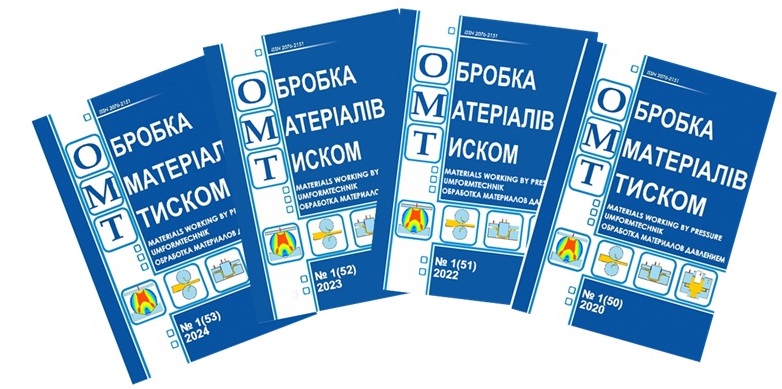About the Journal

ISSN: 2076-2151
Founder: Donbass State Engineering Academy
Year of foundation: 2008 (The publication is a continuation of the scientific and technical collection "Improvement of processes and equipment for pressure treatment in metallurgy and mechanical engineering")
Certificate of state registration: KV № 13770-2744R dated March 17, 2008
Registration with the Ministry of Education and Science of Ukraine: re-registered
(Order of the Ministry of Education and Science of Ukraine № 320 dated 07.04.2022) (Annex 7)
Language of publication: Ukrainian, English, Russian, German
Field of science: technical sciences
Frequency: 1-3 times an hour
Thematic orientation of the scientific professional publication - specialties in which the publication publishes scientific papers:
131 - Applied Mechanics
132 - Materials Science
136 - Metallurgy
Issues: coverage of the latest scientific and practical information obtained during research and industrial implementation of the Academy, in the field of processes and pressure treatment machines
Indexing in bibliographic databases and online libraries:
Vernadsky National Library of Ukraine, Google Scholar, Сross Ref.
Aims and scope
The Journal publishes and disseminates original research in the field of material forming. The research should constitute major achievements in the understanding, modeling or simulation of material forming processes. In this respect, forming implies a deliberate deformation of material.
The journal establishes a platform of communication between engineers and scientists, covering all forming processes, including sheet forming, bulk forming, powder forming, forming in near-melt conditions (injection moulding, thixoforming, film blowing etc.), micro-forming, hydro-forming, thermo-forming, incremental forming etc. Other manufacturing technologies like machining and cutting can be included if the focus of the work is on plastic deformations.
All materials (metals, ceramics, polymers, composites, glass, wood, fibre reinforced materials, materials in food processing, biomaterials, nano-materials, shape memory alloys etc.) and approaches (micro-macro modelling, thermo-mechanical modelling, numerical simulation including new and advanced numerical strategies, experimental analysis, inverse analysis, model identification, optimization, design and control of forming tools and machines, wear and friction, mechanical behavior and formability of materials etc.) are concerned.
Papers should describe new forming processes, experiments, models or modelling techniques, related to forming or the relation between process conditions and product properties. In general, simulation results should be validated by experiments unless the focus is purely on novel modelling techniques. New models or modelling techniques should have a broad applicability in forming simulations and should not be restricted to one particular shape.
Results of analytical or numerical models that are not translated into new knowledge or are not supported by experimental validation will not be accepted. Similarly, submissions that describe experimental results without thorough evaluation and conclusion and thus not leading to new knowledge, will be rejected. The relevance for forming technologies and the novelty of the work should be clearly described in the Abstract.
